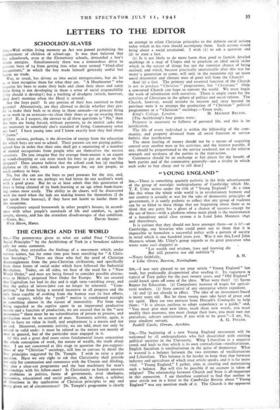THE CHURCH AND THE WORLD SIR,—The prominence given to what
are called Four "Christian Social Principles" by the Archbishop of York in a broadcast address calls for some comment.
Clearly, they crystallise the findings of a movement which, under various names, has for some time past been searching for "A Chris- tian Sociology." There are those who feel the need of Christian disentanglement from the post-Christian civilisation, and specifically from those forms of social order which have followed the Industrial Revolution. Today, on all sides, we hear of the need for a "New World Order," and men are being forced to consider possible alterna- tives to Hitler's proposed New Order for Europe. We are assured that Capitalism has had its day and is nigh unto vanishing away, and that the policy of laissez-faire can no longer be tolerated. "Com- petition," far from being a natural incentive to all progress and the only force capable of evoking from the human race its best efforts, is itself suspect, whilst the " profit " motive is condemned outright as something almost in the nature of immorality. Far from man being regarded as the captive agent in an impersonal productive system and a function of production, we are assured that in the "new economics" there must be no subordination of person to process, and production must be on account of man. Economic activity, again, is held to have no value in itself, and employment is a means and not an end. Moreover, economic activity, we are told, must not only be related to valid ends: it must be related to the nature not merely of man in general, but of the particular man engaged in it.
All this and a great deal more raises fundamental issues concerning the whole conception of work, the nature of wealth, the truth about man. I am not concerned at this stage to question the pre-supposi- tions of any " Christian " sociology, still less to canvass in detail the four principles suggested by Dr. Temple. I wish to raise a prior question. Have we any right to ask that Christianity shall provide not only for communion and commerce with the Unseen and Abiding, but also a clear-cut programme and the best machinery for man's rehtionships with his fellow-men? Is Christianity to furnish answers to problems in politics, forms of government, rival ideologies, economics, educational and social policies, and, in short, a syllabus of directions in the application of Christian principles to any and every given set of circumstances? Dr. Temple's programme is clearly
an attempt to relate Christian principles to the definite social actions today which in his view should accompany them. Such actions would bring about a social revolution'. I wish (r) to ask a question and (2) to state a fact.
(r) Is it not likely to do more harm than good to furnish detailed markings in a map of Utopia and to proclaim an ideal social order which in the nature of things has not the remotest chance of being realised, and which, because practically unattainable after this war for many' a generation to come, will only in the meantime stir up more social discontent and alienate men of good will from the Church?
And (2) a fact. The primary and essential function of the Church is not to produce " Christian " programmes, but "Christians." Only a converted Church can hope to convert the world. We must begin the work of reformation with ourselves. There is ample room for the activities of Christians in the sphere of politics and social reform. The Church, however, would mistake its mission and stray beyond its province were it to attempt the production of " Christian " political programmes or a " Christian " sociology.—Yours truly, King's College, London. • H. MAURICE RELTON. [The Archbishop's four points were:
Property is necessary to fullness of personal life, and this is its justification.
The life of every individual is within the fellowship of the com- munity, and property divorced from all social function or service forfeits that justification.
The mere lending of money should not be a means of acquiring control over another man or his activities, and the interest payable, if any, should be proportioned to the service rendered, not to the relative strength and weakness of the parties to the transaction.
Commerce should be an exchange at fair prices for the benefit of both parties and of the community generally—not a rivalry in which each seeks to buy cheap and to sell dear.]


























 Previous page
Previous page